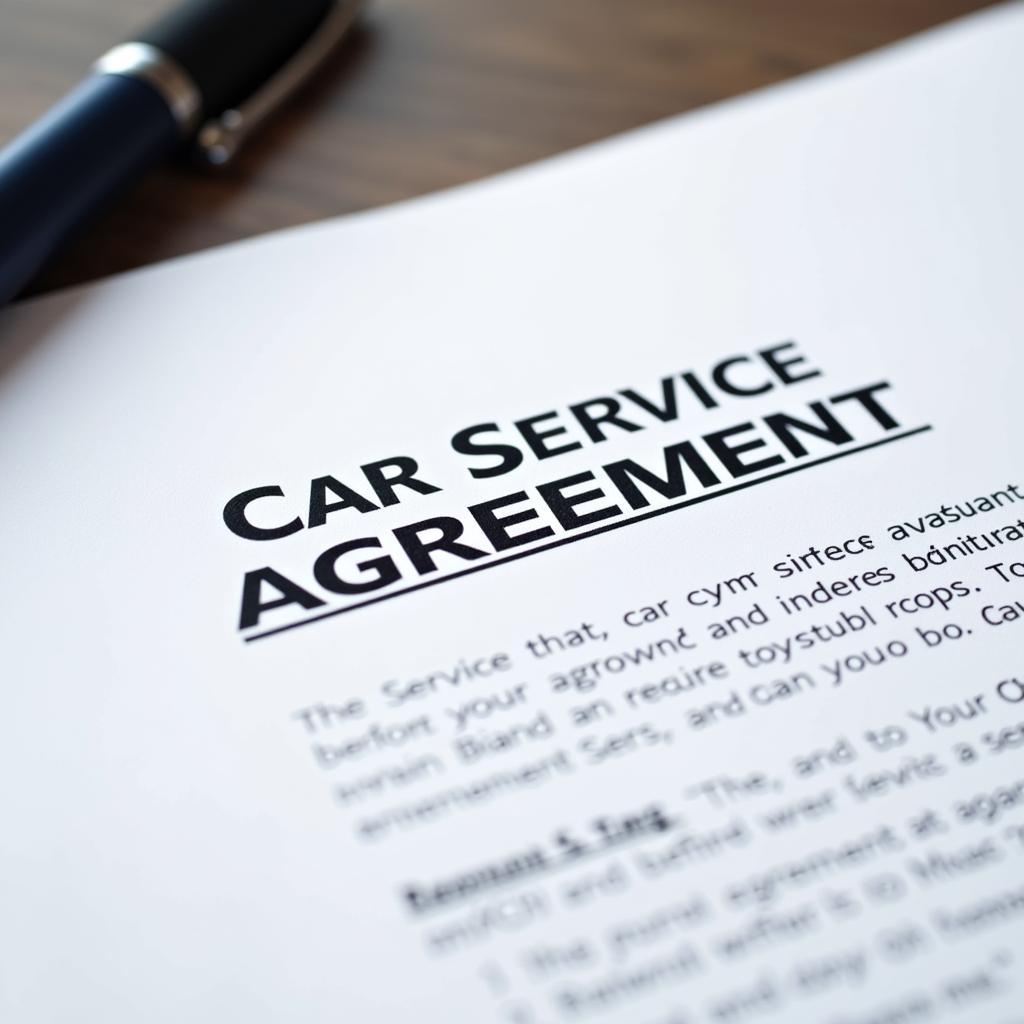Do I Need a Service Agreement on a New Car?
You’ve just driven your gleaming new car off the lot – congratulations! The excitement is palpable, but amidst the euphoria, a practical question might arise: Do I need a service agreement on a new car? It’s a valid concern, and the answer depends on a few factors. Let’s dive into the world of service agreements, explore their pros and cons, and help you determine if one is right for you.
Understanding Service Agreements
A service agreement, also known as an extended warranty, is essentially a contract you purchase for your vehicle that covers the cost of certain repairs beyond the manufacturer’s warranty period. They’re designed to protect you from unexpected and potentially expensive repair bills, offering peace of mind when it comes to maintaining your car.
Weighing the Pros and Cons
Before making a decision, it’s crucial to carefully consider both the advantages and disadvantages of having a service agreement on your new car.
Advantages of a Service Agreement
- Financial Protection: The most significant benefit is the potential cost savings on major repairs, especially as your car ages and components begin to wear out.
- Peace of Mind: Knowing you’re covered for unforeseen mechanical issues can alleviate anxiety and provide budget predictability for your car ownership experience.
- Increased Resale Value: A transferable service agreement can be attractive to potential buyers, potentially boosting your car’s resale value.
Disadvantages of a Service Agreement
- Upfront Cost: Service agreements often involve a significant upfront payment or monthly installments, which can strain your budget.
- Limited Coverage: Not all agreements are created equal. Some might have limitations on covered components, mileage restrictions, or require you to use specific repair shops.
- Potential for Unused Coverage: If your car proves reliable and you don’t experience major repairs, you might end up paying for coverage you never utilize.
 Car Service Agreement Contract
Car Service Agreement Contract
Factors to Consider When Deciding
Now that you understand the potential benefits and drawbacks, let’s examine some key factors to help you determine if a service agreement aligns with your needs and driving habits.
1. Your Driving Habits
- Mileage: If you’re a high-mileage driver, clocking up significant distances annually, a service agreement might be a worthwhile investment to safeguard against wear and tear.
- Driving Conditions: Harsh weather conditions, rough terrain, or frequent city driving can put additional stress on your vehicle, making a service agreement more appealing.
2. Your Vehicle’s Reliability
- Make and Model: Research the reliability history of your car’s make and model. Some vehicles are known for their dependability, while others have a higher likelihood of requiring repairs.
- Vehicle History: If you’ve purchased a used car, a pre-inspection by a trusted mechanic can reveal potential issues that a service agreement might cover.
3. Your Risk Tolerance and Budget
- Financial Cushion: Assess your financial situation. If you have an emergency fund to cover unexpected car repairs, you might feel comfortable forgoing a service agreement.
- Peace of Mind: Conversely, if the thought of unexpected repair bills keeps you up at night, a service agreement can provide valuable peace of mind.
Alternatives to Service Agreements
If a service agreement doesn’t seem like the right fit, there are alternative approaches to consider for managing potential car repair costs.
- Build an Emergency Fund: Regularly set aside a dedicated amount of money specifically for unexpected car repairs. This self-funded approach allows you greater flexibility and control over your finances.
- Negotiate with the Dealership: Don’t be afraid to negotiate the price of a service agreement or explore different coverage options with the dealership.
- Consider Third-Party Providers: Explore reputable third-party warranty providers who might offer more competitive pricing or customizable coverage plans.
Making an Informed Decision
Ultimately, the decision of whether or not to purchase a service agreement on your new car is a personal one. There’s no right or wrong answer, as the best choice depends on your individual circumstances, driving habits, and financial comfort level.
Expert Insight: “Remember, knowledge is power when it comes to making informed decisions about your car,” says automotive expert John Smith, CEO of CarCare Solutions. “Take your time, research your options, and choose the path that aligns best with your needs and budget.”
By carefully considering the factors outlined in this article, you can confidently decide if a service agreement is the right choice for your new car, ensuring a smoother and potentially more cost-effective ownership experience.
FAQs about Service Agreements on New Cars
1. Can I purchase a service agreement after I’ve already bought my car?
Yes, in many cases, you can purchase a service agreement within a certain timeframe after buying your new car. Check with the dealership or explore options with third-party providers.
2. What happens to my service agreement if I sell my car?
Some service agreements are transferable to subsequent owners, potentially increasing your car’s resale value. Review the terms and conditions of the agreement to understand the transfer process.
3. Are routine maintenance services covered by a service agreement?
Generally, service agreements focus on unexpected repairs rather than routine maintenance like oil changes or tire rotations. Refer to the agreement’s specific terms for coverage details.
Common Situations When Considering a Service Agreement
- Purchasing a luxury or high-performance vehicle: These vehicles often come with higher repair costs, making a service agreement more appealing.
- Opting for a longer loan term: If you’re financing your car over an extended period, a service agreement can provide coverage that extends beyond your loan payments.
Looking for More Car Care Advice?
Explore these helpful resources on CarServiceOnline:
Get in touch with our team of car care experts for personalized assistance and guidance. Contact us via WhatsApp at +1(641)206-8880 or email us at [email protected]. We’re here to support you 24/7.
